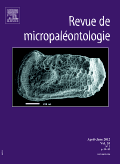
REVUE DE MICROPALEONTOLOGIE
Scope & Guideline
Illuminating Earth's Biodiversity Through Microfossil Exploration
Introduction
Aims and Scopes
- Microfossil Analysis:
The journal emphasizes research on various microfossils, including foraminifera, nannoplankton, and ostracods, exploring their morphological, ecological, and biostratigraphical significance. - Paleoceanographic Studies:
A significant focus is placed on paleoceanography, where studies link microfossil records to past oceanographic conditions, climate change, and sea-level fluctuations. - Biostratigraphy and Chronostratigraphy:
The journal frequently publishes studies that utilize microfossils for biostratigraphic dating and understanding geological formations, contributing to the stratigraphic framework of different regions. - Environmental and Ecological Implications:
Research often investigates the ecological roles of microfossils in past environments, contributing to the understanding of biodiversity, extinction events, and ecosystem dynamics over geological timescales. - Technological Innovations:
The journal highlights advancements in analytical techniques, such as imaging and molecular methods, that enhance the study of microfossils and their applications in paleoenvironmental reconstructions.
Trending and Emerging
- Climate Change and Microfossil Response:
Research increasingly focuses on how microfossil assemblages respond to climate change, highlighting the relevance of these organisms as indicators of past environmental shifts. - Integrated Multi-Proxy Approaches:
There is a growing trend towards integrating multiple data types (e.g., geochemistry, isotopes, and microfossil analyses) to provide comprehensive insights into paleoenvironmental conditions. - Technological Advancements in Microfossil Analysis:
The application of advanced imaging techniques, machine learning, and molecular methods is on the rise, enabling more detailed studies of microfossil morphology and ecology. - Human Impact on Marine Environments:
An emerging theme involves understanding the impact of anthropogenic activities on marine ecosystems, with microfossils serving as indicators of historical changes due to human influence. - Paleoecological Dynamics and Ecosystem Changes:
Research increasingly examines the ecological roles and interactions of microfossils, contributing to a better understanding of past marine ecosystems and their dynamics.
Declining or Waning
- Traditional Taxonomy:
There appears to be a waning interest in purely taxonomic studies of microfossils, as the focus shifts toward integrative approaches that combine taxonomy with ecological and environmental analyses. - Paleoenvironmental Reconstruction Based Solely on Micropaleontology:
There is a noticeable decrease in studies that exclusively rely on micropaleontological data for paleoenvironmental reconstructions, with more recent research emphasizing multi-proxy approaches. - Geographic Specificity in Studies:
Research that focuses narrowly on specific geographic areas without broader implications or comparisons has seen a decline, as the journal encourages studies with wider relevance and applicability. - Descriptive Studies without Analytical Depth:
Studies that provide mere descriptions of microfossil assemblages without exploring their implications for understanding broader geological or environmental contexts are becoming less common.
Similar Journals
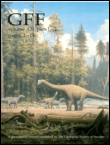
GFF
Connecting Scholars to the Rich History of Earth.GFF is a prestigious academic journal dedicated to advancing research in the fields of Geology and Paleontology. Published by Taylor & Francis Ltd in the United Kingdom, GFF serves as a vital platform for disseminating innovative findings and fostering discussions among researchers, professionals, and students alike. With a noteworthy impact factor reflecting its significance in the scientific community, GFF has achieved Q2 ranking in both Geology and Paleontology, underscoring its commitment to high-quality scholarship. The journal has been operational since 1872, accumulating a rich history of contributing to our understanding of earth sciences. It currently ranks #133 out of 321 in Earth and Planetary Sciences - Geology, and #50 out of 113 in Paleontology according to Scopus rankings. Although it does not offer an open access option, GFF remains accessible through various academic databases, ensuring that cutting-edge research reaches a wide audience. Its comprehensive scope aims to explore critical advancements in geological and paleontological sciences, making it an essential resource for those committed to exploring the intricacies of our planet’s past and present.
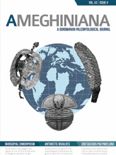
AMEGHINIANA
Illuminating the Past: Insights into Ecology and PaleontologyAMEGHINIANA is a distinguished academic journal published by the ASOCIACION PALEONTOLOGICA ARGENTINA, serving as a vital platform for the dissemination of cutting-edge research in the fields of Ecology, Evolution, Behavior and Systematics, as well as Paleontology. With its ISSN 0002-7014 and E-ISSN 1851-8044, the journal has established itself as a key reference point for scholars seeking to explore the intricate relationships within ecological systems and the evolutionary history of species. Despite not offering open access, AMEGHINIANA maintains a reputation bolstered by a Q3 ranking in both its subject categories, underlining its sustained commitment to enhancing scientific knowledge. Researchers and professionals alike benefit from this journal’s extensive archive of studies dating back to 1985, with ongoing contributions expected until 2024. With a focus on high-quality content, this journal is essential for anyone immersed in the study of paleobiology and ecological systems.
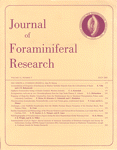
JOURNAL OF FORAMINIFERAL RESEARCH
Unveiling the Mysteries of Foraminifera and Their EnvironmentsJOURNAL OF FORAMINIFERAL RESEARCH is a premier academic journal published by the Cushman Foundation for Foraminiferal Research, dedicated to advancing the field of foraminiferal studies within the broader disciplines of paleontology and microbiology. Established in 1979, this journal has been a vital publication for researchers aiming to explore the intricate relationships between foraminifera and their environments, contributing to a deeper understanding of earth's history. With a Q4 ranking in Microbiology and a Q3 ranking in Paleontology as of 2023, it plays an essential role in shaping scholarly discourse in these areas. Although it currently does not offer open access, the journal remains a valuable resource for scientists, professionals, and graduate students eager to engage with contemporary research findings and methodologies. The subtle interconnections between foraminiferal research and broader ecological implications underscore the journal's commitment to fostering academic inquiry, making it an indispensable ally for those invested in the ongoing scientific exploration of our planet.
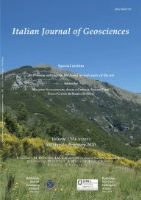
Italian Journal of Geosciences
Unlocking Planetary Insights: Where Earth Meets ResearchItalian Journal of Geosciences, published by the Società Geologica Italiana, is a distinguished platform for the dissemination of research in the fields of Earth and Planetary Sciences and Geology. With an impressive impact factor reflected in its 2023 rankings, where it placed in the Q3 category across its related fields, this journal serves as a vital resource for academics, practitioners, and students. Established in 2010 and poised to continue until 2024, the journal showcases critical advancements and interdisciplinary studies that deepen our understanding of geological processes and Earth systems. Operating under open access options, it offers robust accessibility to a broad audience, facilitating wider dissemination of knowledge. The journal's affiliation with Università degli Studi La Sapienza in Rome, Italy, further underscores its commitment to academic excellence and innovation in geosciences.

Quaternary Science Advances
Catalyzing Global Collaboration in Earth SciencesQuaternary Science Advances, published by ELSEVIER, is a distinguished open access journal that has rapidly gained recognition in the fields of Earth and Planetary Sciences since its inception in 2020. With an impressive impact factor reflected by its Q2 ranking across various categories including Earth-Surface Processes and Geology, this journal serves as a vital platform for researchers and professionals aiming to advance the understanding of Quaternary environments and processes. Positioned within the 73rd percentile in Earth and Planetary Sciences and bolstered by a robust global readership, Quaternary Science Advances not only facilitates the dissemination of high-quality research but also encourages interdisciplinary collaboration. The journal’s open access model ensures that cutting-edge findings are readily available to students, researchers, and practitioners across the globe. With a commitment to promoting innovative studies from 2020 to 2024 and beyond, this journal remains a cornerstone for advancing knowledge within the dynamic landscape of Earth sciences.

Stratigraphy
Decoding Earth's History Through Fossil RecordsStratigraphy is a distinguished journal dedicated to advancing the field of paleontology and stratigraphic research. Published by MICRO PRESS in the United States, this journal is accessible via its ISSN 1547-139X and E-ISSN 2331-656X, providing an essential platform for researchers, professionals, and students alike. With a robust focus on the intricate relationships between geological time and the fossil record, Stratigraphy aims to disseminate high-quality research that enhances our understanding of Earth’s history. Its ranking within the 2023 Q2 category of paleontology reflects its commitment to scholarly excellence, as noted by a Scopus ranking of #65 out of 113 in the Earth and Planetary Sciences domain, placing it in the 42nd percentile. Although not open access, the journal's valuable contributions from 1988 to 2024 encourage a collaborative dialogue among the scientific community, underscoring the significance of stratigraphic studies in environmental and evolutionary research.

REVISTA BRASILEIRA DE PALEONTOLOGIA
Exploring Earth's Ancient Life Through Rigorous ResearchREVISTA BRASILEIRA DE PALEONTOLOGIA (ISSN: 1519-7530, E-ISSN: 2236-1715) is a premier academic journal dedicated to the field of paleontology, published by the esteemed SOCIEDADE BRASILEIRA DE PALEONTOLOGIA. Operating under a Q3 quartile ranking in the 2023 Scopus statistics for Paleontology, this journal serves as a vital platform for researchers, professionals, and students to disseminate and engage with cutting-edge discoveries and methodologies in paleontological studies. With a broad scope that encompasses various aspects of Earth's historical life, REVISTA BRASILEIRA DE PALEONTOLOGIA provides an essential resource for the scientific community, particularly those based in Brazil and South America. The journal is committed to promoting rigorous research and fostering collaboration among scholars, ultimately contributing to advancements in the understanding of past biodiversity and extinction events. Its thoughtful curation of articles since 2010 ensures that it remains at the forefront of paleontological scholarship, despite its limited HIndex and open access options. This journal is a crucial asset for anyone looking to deepen their understanding of evolutionary processes that have shaped our planet.
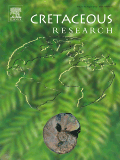
CRETACEOUS RESEARCH
Unearthing the Secrets of the Cretaceous EraCRETACEOUS RESEARCH, published by Academic Press Ltd - Elsevier Science Ltd, is a leading journal in the field of Paleontology that has established itself as an essential resource for researchers and professionals delving into the rich tapestry of the Cretaceous period. With its ISSN 0195-6671 and E-ISSN 1095-998X, this journal boasts a prestigious placement in the academic landscape, holding a Q1 rank in the 2023 Paleontology category and proudly positioned at 21st out of 113 in the Scopus ranking, reflecting its impact factor that places it in the 81st percentile. Since its inception in 1980, CRETACEOUS RESEARCH has facilitated a deeper understanding of prehistoric life and its evolutionary processes, covering topics such as fossil discoveries, paleoecology, and biostratigraphy. This journal best serves those seeking to expand their knowledge and contribute innovative findings to the scientific discourse surrounding the Cretaceous era. As it continues to converge into the future until 2025, it remains dedicated to providing an open platform for the dissemination of high-quality research that shapes our understanding of Earth’s geological past.
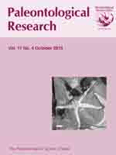
PALEONTOLOGICAL RESEARCH
Unveiling Earth's Ancient Secrets.PALEONTOLOGICAL RESEARCH, published by the PALAEONTOLOGICAL SOCIETY OF JAPAN, is a prominent peer-reviewed journal that addresses key developments in the field of paleontology, ecology, and evolutionary biology. With an ISSN of 1342-8144, this journal has established itself as a vital resource for researchers and professionals who seek to explore the intricate history of life on Earth, integrating insights into evolutionary dynamics and ecological frameworks. Operating since 1997 and with content converging up to 2023, PALEONTOLOGICAL RESEARCH occupies a notable position, ranked in the second quartile within both Ecology, Evolution, Behavior and Systematics and Paleontology categories. While it is not an open-access journal, its rich repository of studies significantly contributes to the academic community. Researchers and students engaged in the exploration of ancient ecosystems and their implications for current biodiversity are sure to find valuable insights within its pages, reinforcing the journal's importance as a leading platform for disseminating paleontological knowledge in Japan and beyond.
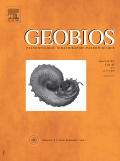
GEOBIOS
Exploring Earth's Past and BeyondGEOBIOS is a prominent academic journal published by Elsevier France-Editions Scientifiques Medicales Elsevier, specializing in the fields of Paleontology, Space and Planetary Science, and Stratigraphy. With a rich publication history dating back to 1966, the journal aims to foster scholarly communication and dissemination of significant research findings among professionals and researchers in earth sciences. Recognized for its impact within the scientific community, GEOBIOS holds a respectable Q2 ranking in several categories, positioning it within the top tiers of scientific journals. Despite its traditional publication format, the journal provides a platform for groundbreaking studies that influence our understanding of both the geological past and future planetary developments. The journal's consistent ranking, including Rank #36 in Paleontology and Rank #59 in Space and Planetary Science, underscores its relevance and significance in its field. GEOBIOS serves as an essential resource for those engaged in the exploration of earth's history and its extraterrestrial counterparts, making it invaluable to researchers, students, and professionals alike.